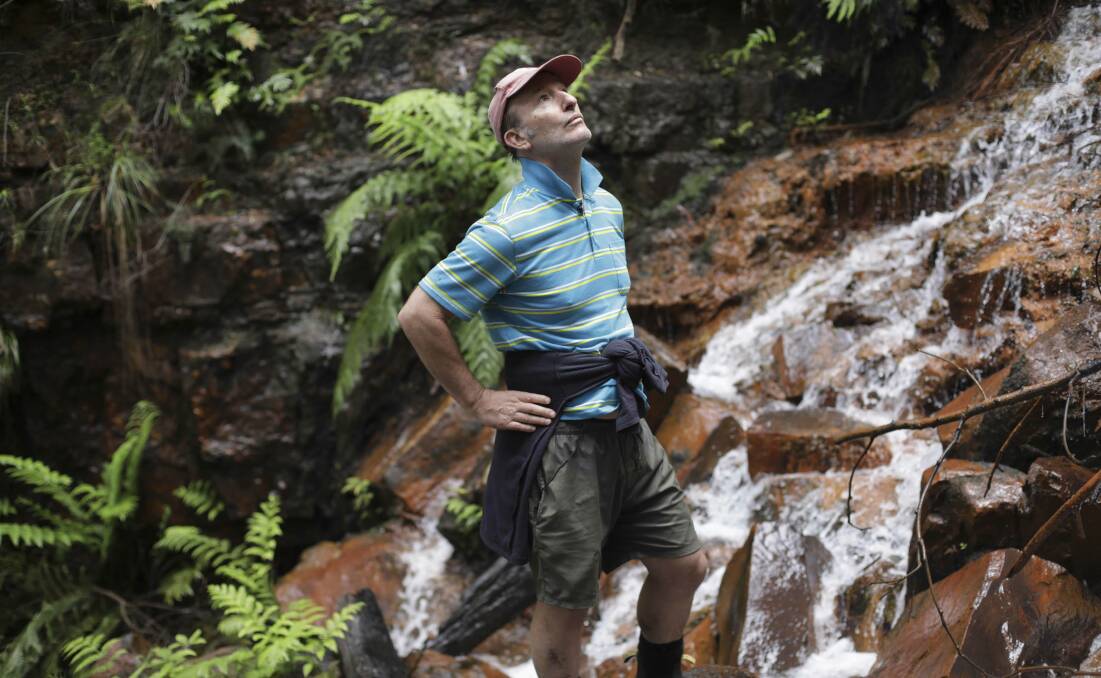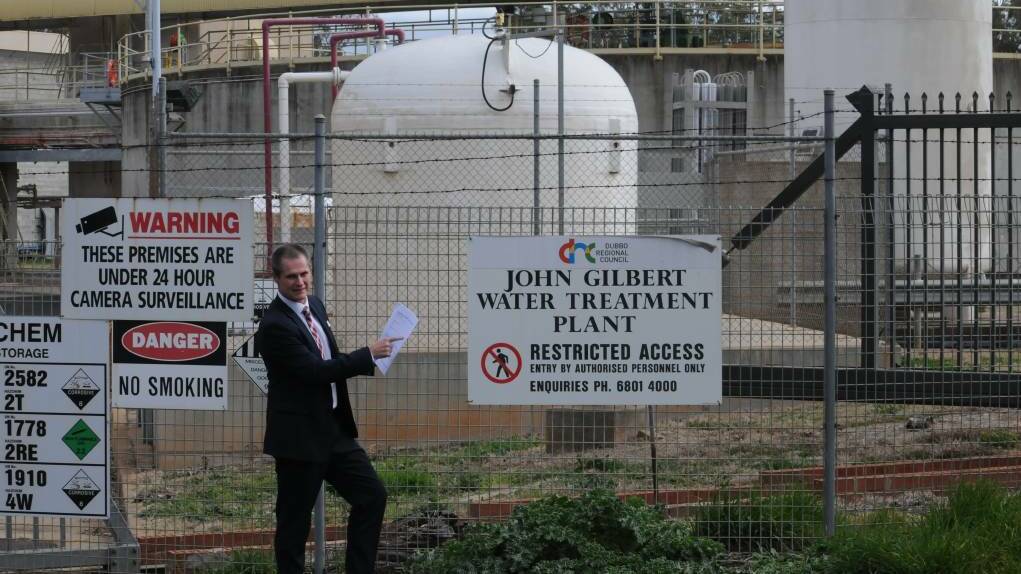
A water expert says the current situation in Dubbo is a scandal and one which gives him goosebumps.
Subscribe now for unlimited access.
or signup to continue reading
During the middle of last year, Dubbo went without clean drinking water for more than a month due to organic matter washing into the water treatment plant - an issue that even resulted in premier Dominic Perrottet commenting - while it was only in December when council was forced to alert NSW Health to an "earthy smell" in the city's drinking water.
Earlier this month it was announced Wellington and surrounds was temporarily without fluoride in its water after a pump at the fluoride dosing system at Wellington's Water Treatment Plant failed.
That came as Dubbo's water supply remains un-fluoridated following the discovery last year that council had - unbeknownst to the public - not been fluoridating the local water supply for the past three-and-half years.
Earlier this month, residents were also put on 24-hour water restrictions after high levels of organic matter were again washed into the treatment plant.
Now, a number of Dubbo's residents have taken to buying bottled water citing they couldn't drink the tap water due the taste.
University of Western Sydney water researcher Ian Wright, who has spent a number of years working in the Orana, Far West and Central West regions, said all water authorities are required to produce a high quality drinking water.
"There are very clear guidelines but one of them is that it produces acceptable water quality to people that drink it. I think it is fair to say Dubbo is failing that one," he said.
As part of the Australian Quality Water guidelines, council has to monitor complaints to make sure they meet the criteria that taste was acceptable to the residents.
"I looked at their website and it doesn't look straight forward, I even looked up their policy. Maybe you have to call them but even then how do you know your complaint is being recorded correctly? How would they know how many people are affected by the water issue unless they're recording that?" Dr Wright said.
Compared to Mudgee, Lithgow and Orange, Dr Wright said the water quality in Dubbo had to be the worst, with a high amount of sodium.
Tough industry to be in
Professor Wright said he felt sorry for the water industry in regional towns because they "are required to produce fantastic water quality" while the water quality guidelines, expectations and policies are "really tough".
"I think that's 40 per cent of the problem," he said.
"They are required to meet tougher and tougher standards and this is broadly under the umbrella of United Nations sustainable development goal number six, the basic human right of all people is to have good quality water and waste water."
Dr Wright said the standard of services in the city was vastly different to those in the country.
"But I am surprised we are having this conversation about Dubbo because it's a city. It's one of Australia's big regional cities," he said.
"Often in smaller places they've got aged infrastructure and I'm seeing a common problem in drought and post flooding. Obviously Dubbo's source water is the Macquarie River and just about everything you see with flood water is brown, so it's mobilised all these pollutants and they've got to amend their treatment of water to provide acceptable water quality with these tough standards."

Dr Wright labelled a 2020 Audit Office report into the Department of Planning, Industry and Environment's water strategy, as "scathing" but ultimately true.
The report stated "The Department of Planning, Industry and Environment has not effectively supported or overseen town water infrastructure planning in regional NSW since at least 2014. It has also lacked a strategic, evidence-based approach to target investments in town water infrastructure."
Dr Wright said regional Australia was relied on for production, wealth, employment but they weren't getting the resources to help them.
A continued focus on coordinating town water planning, investments and sector engagement is needed for the department to more effectively support, plan for and fund town water infrastructure, and work with Local Water Utilities to help avoid future shortages of safe water in regional towns and cities, the report concluded.
The fluoride issue
With Dubbo Regional Council hoping to fix the fluoride in Dubbo's water by June 30 2023, and to get a replacement pump by mid March for Wellington's fluoride, Professor Wright said it was a "scandal".
"It's a NSW thing in water in my experience, government of all levels, local, state, federal, withhold information back. That's really serious because oral health is so closely linked to overall human health," he said.
"Particularly a place like Wellington, there's a lot of vulnerable people that probably don't have access to the dental services which are not subsidised like medicine."
Dr Wright said "it wasn't good enough" and fails one of the criteria's of acceptable water quality. While the quality is subjective, not having fluoride in the water undermines people's confidence they are getting the highest quality.
"When people start losing confidence they start spending money on bottled water," he said.
"It's distressing to hear [what's happening in Dubbo], Dubbo is a city and it's a really big regional centre and it's a bit like Orange, Bathurst, Wagga, Tamworth, Armidale, and they shouldn't be having problems of this scale."
Better technology needed
With five million rate paying customers, Sydney Water is able to improve their standards with advanced water treatment.
Dr Wright says this allows them to outsource and have external companies run the water treatment plants.

"They've got a fantastic revenue stream and the companies they outsource are bloody good at doing that and its the most advanced processes done by specialists and then Sydney water can just monitor the contracts and stamp their feet if they feel they aren't delivering them," he said.
Whereas, in regional centres who don't have that rate base or access to that level of technology and expertise struggle.
The Australian Infrastructure Audit 2019 stated that Australians have come to expect a high quality of water services.
"Water services across the country are not available equitably, and the gap between users at each end of the spectrum is growing. Services in many cities are evolving and improving, propelled by strong revenue bases and access to new technologies that reduce costs for service providers and improve the customer experience," the report stated.
On the other hand it is a different story for remote communities where services are not meeting the standards residents would expect.
"Independent audits of compliance in remote communities are relatively infrequent, often limited in scope, and rarely publicly disclosed," the report said.
In a conversation with the Daily Liberal, mayor Mathew Dickerson said they wouldn't be looking at upgrading the water treatment plant for another "five to ten years" but Mr Wright said that wasn't "sustainable".
"This is really serious...you don't hear problems like that in big cities. We aren't talking about small town of 500 or 1000 people where you can understand they might not have the best assets and processes," Dr Wright said.
Government needs to step up and help
With an election coming up, Professor Wright said Dubbo's water issue should be at the front of candidates' minds.
Dr Wright said he's supported by the auditor general when he says Dubbo needs far more commonwealth and state government support.
"The country is growing and people are moving to Dubbo and other centres and the infrastructure should catch up," he said.
He said council's should be given a pat on the back for trying to do as well as they possibly can.
"But they need help," he said.
Dr Wright said billions had been spent on desalination plants, something that Dubbo would probably do anything for during the drought.
"We can snap our fingers in the city and get any of these problems fixed but that is not the case when local government have to do everything else that they do and also produce high quality water with such a highly variable environment," he said.
"It's pretty tough to get criticised for it when you've got limited ability in terms of resources and expertise and technology to fix the problem."
Dr Wright said it makes his blood boil to see how badly regional center's get treated.
"There's that old joke that NSW stands for Newcastle, Sydney and Wollongong and I think that's true in so many ways, but I think the council has massive challenges, I think they're struggling to admit it and they need help," he said.
Professor Wright encouraged Dubbo residents to report to council if they were unhappy with Dubbo's water because council needs hard data to see that something is wrong.
Our journalists work hard to provide local, up-to-date news to the community. This is how you can continue to access our trusted content:
- Bookmark
- Make sure you are signed up for our breaking and regular headlines newsletters
- Follow us on Twitter
- Follow us on Instagram
- Follow us on Google News


